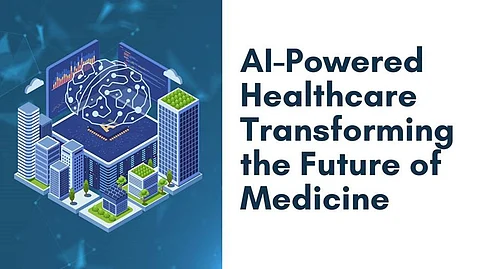

In the uncomplicated form of artificial intelligence (AI) in rapid skill advancement, the healthcare assignment is theirs with a view towards revolutionizing human diagnostics and treatment methods as well as the human way of patient care. This is just what technology commentator Vinod Uputturi examines deeply within the context of AI's changes within modern medicine-and-how AI adds insights into the changing dynamics of healthcare while raising its own set of integration challenges. These advancements in AI are ushering in collaboration between medical professionals and technical developers so that anything built is grounded and ethical. As developments continue to be made, AI is opening avenues to other possibilities in precision medicine and patient care.
AI algorithms apply vast medical data sets, including imaging scans, lab results, and patient histories, with unmatched accuracy. Patterns identified by these tools to enhance early disease detection and improve diagnostic precision perhaps elude even seasoned healthcare professionals.
For example, AI-assisted imaging tools are now detecting cancers and cardiovascular diseases with a level of accuracy comparable to that of human radiologists. These tools accelerate the diagnostic process and can ensure that patients receive timely interventions, which may save their lives. Furthermore, AI decision support systems help physicians select the best course of action for treatment, lowering the odds of a misdiagnosis. As AI continues to learn, it sharpens its accuracy further so that its diagnostic precision will be on an even higher level.
Whether in early diagnoses or therapeutic planning, artificial intelligence systems have become the backbone of personalized medicines that adapt treatment according to patient data. By evaluating genetic data, lifestyle factors, and clinical histories, it provides predictions regarding how an individual responds to treatment. In oncological applications, AI-based genomic analyses assist in deciding on the best treatment alternatives based on the tumor's genetic profile.
In areas other than oncology, AI optimizes the medication regimen in chronic conditions to ensure that therapeutic options are tailored to the needs of the patients while minimizing side effects. This personalized approach offers a patient-centered focus, in contrast to the past.
Medical imaging has also been revolutionized with AI incorporation. AI-powered software interprets X-rays, MRIs, and CT scans at speeds that were previously unheard of, aiding radiologists in identifying abnormalities with higher precision. Such systems assist in flagging critical cases so that medical staff can give priority to patients who require immediate attention.
AI's ability to scan medical images quickly is decreasing diagnostic backlogs, automating workflow, and enhancing patient outcomes
Predictive analytics is transforming healthcare by forecasting disease risks and patient outcomes. By analyzing past medical records and lifestyle choices, AI models predict potential health risks, allowing hospitals to allocate resources efficiently.
For example, AI-powered monitoring systems in intensive care units (ICUs) predict patient deterioration, allowing medical staff to intervene before conditions worsen. This proactive approach saves lives and reduces hospital readmissions.
The emergence of AI-driven virtual health assistants improves healthcare accessibility. These digital assistants provide 24/7 medical support, answering patient queries, offering preliminary diagnoses, and guiding users on whether they need immediate medical attention.
AI enhances telemedicine platforms by automating appointment scheduling and interpreting symptoms. These advancements benefit underserved regions where access to healthcare professionals is limited. Additionally, AI-powered chatbots provide real-time medical guidance, reducing unnecessary hospital visits and improving patient engagement.
While AI’s contributions to healthcare are substantial, challenges hinder seamless integration. Data privacy remains a concern, as AI systems require vast patient data. Ensuring this sensitive information is securely stored and complies with data protection regulations is paramount.
Another challenge is integrating AI into existing healthcare infrastructures. Many hospitals rely on legacy systems, making the transition to AI-driven solutions complex and costly. Additionally, biases in AI models pose ethical concerns, as inaccurate data could lead to disparities in diagnoses and treatments.
AI’s role in healthcare will continue expanding. Innovations like AI-powered digital twins virtual patient simulations are being developed to test treatment responses before real-world application. Advancements in quantum computing promise to enhance AI’s ability to process complex medical data, opening new avenues for drug discovery.
As AI gets advanced, their capability to process multi-modal data that integrates medical images, genomics, and clinical notes will sharpen precision medicine. Explainable AI, wherein AI models supply reasons for choices, will help generate trust between health care workers and AI systems.
In conclusion, AI is revolutionizing healthcare, from improving diagnostic accuracy to personalizing treatments and streamlining medical workflows. However, as Vinod Upputuri highlights, successful AI implementation requires balancing technological advancement and ethical considerations. Addressing data security, mitigating biases, and ensuring AI complements human expertise will shape the future of AI-driven healthcare. By embracing innovation responsibly, the medical field can harness AI’s full potential to create a more efficient, accessible, and patient-centric healthcare system.
